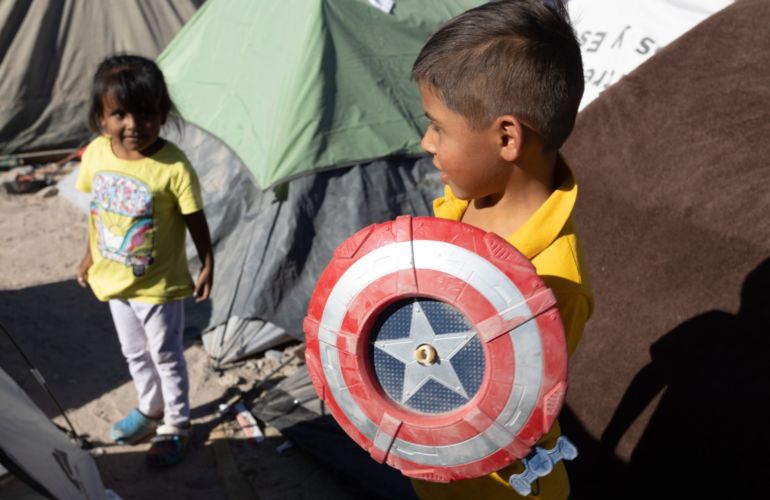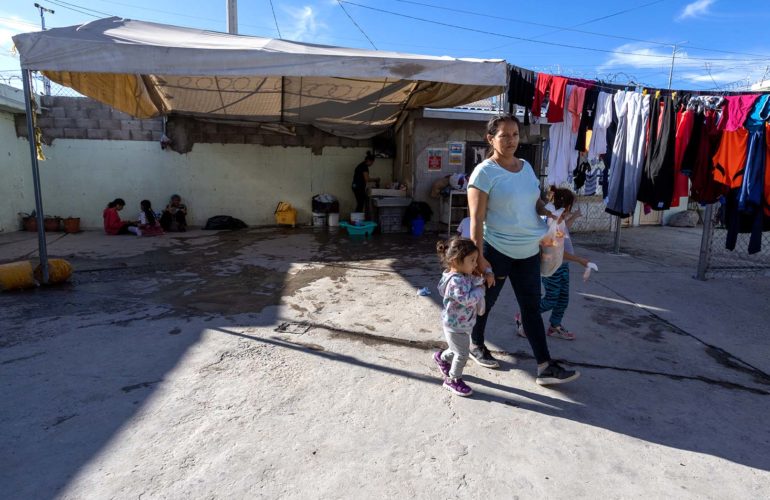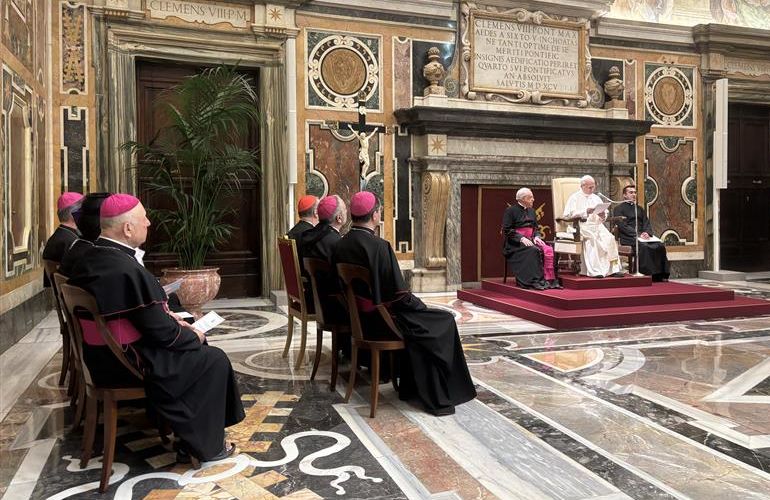ICMC Member in Italy Accompanies Search and Rescue Mission in the Central Mediterranean
Migrantes Foundation, a body of ICMC member the Italian Episcopal Conference, accompanied a Search and Rescue mission saving 182 lives in just 24 hours
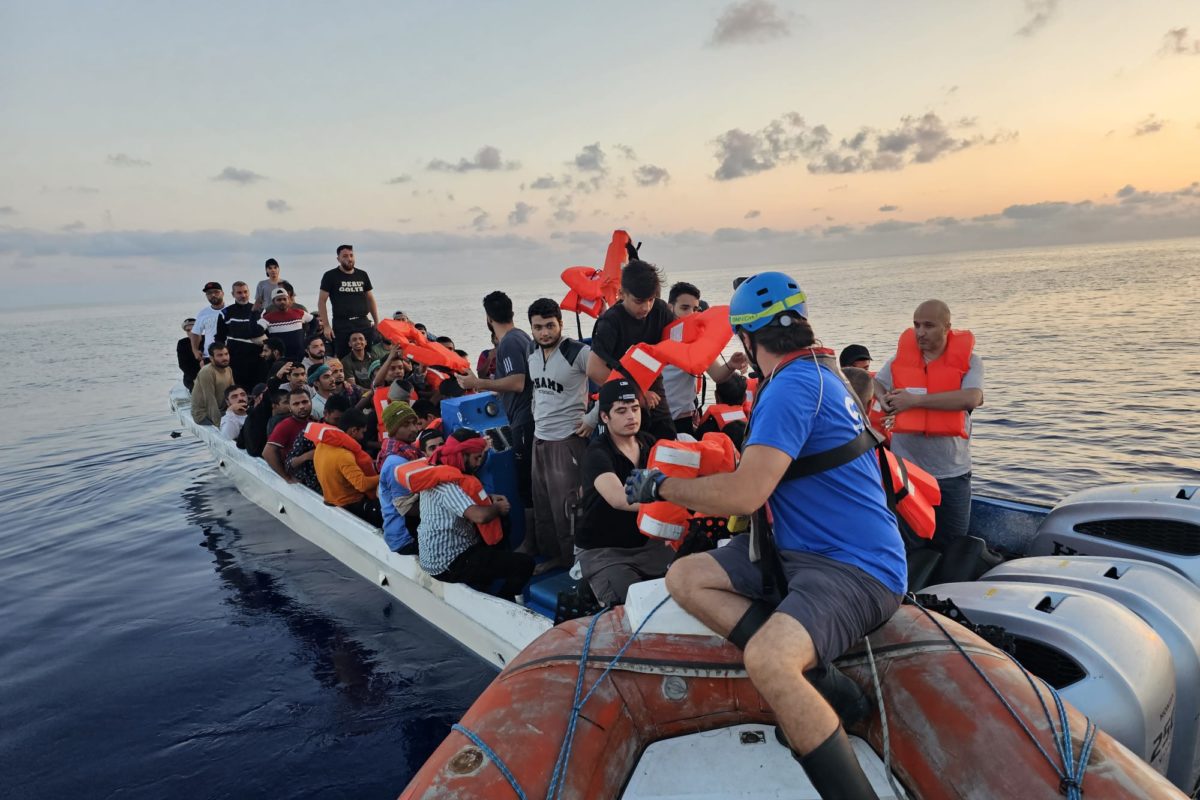
The Mediterranean has been a hub of migration activity for many thousands of years. Since the mid-1990s, migration in the region has centered on movement toward Europe, to where many thousands have since attempted to travel to seek protection, work, and prosperity. Today, migratory routes across the Mediterranean Sea are amongst the most dangerous in the world: since 2014, an estimated 30,000 people have lost their lives while attempting these journeys.
The Migrantes Foundation, a pastoral body of ICMC national member the Italian Episcopal Conference, is responding to the ongoing deaths of migrants in the Mediterranean Sea, by supporting and highlighting lifesaving civil society Search and Rescue (SAR) operations in the Central Mediterranean.
Most recently, the Foundation supported a joint initiative of the diocese of Fano-Fossombrone-Cagli-Pergola and the SAR platform Mediterranea Saving Humans, providing a support boat to accompany the Mediterranea vessel Mare Jonio on a SAR mission, taking place over the weekend of 23-25 August, 2024.
“There is a need to improve awareness and knowledge about migration and asylum, amongst both Christian communities and the general population”, explains His Excellency Monsignor Gian Carlo Perego, President of the Migrantes Foundation. “The formation of public opinion on these issues is a fundamental duty of our Foundation and of the Church, and this is why we chose to support this initiative.”
Dying to reach Europe: migration in the Central Mediterranean
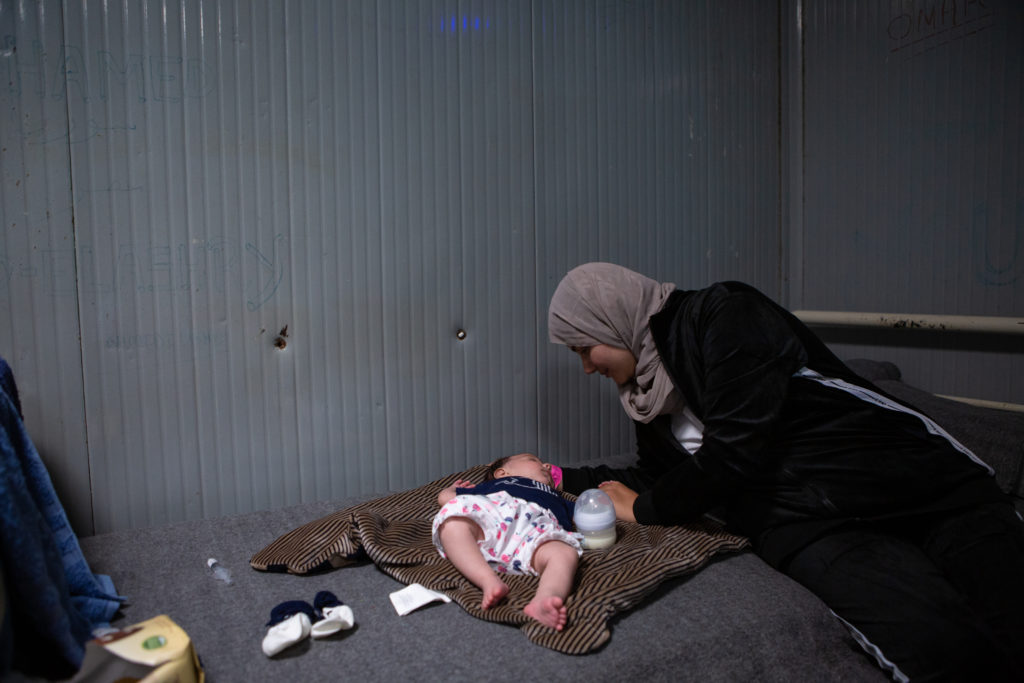
The East, West, and Central Mediterranean are the three main migration routes across the Mediterranean to Europe. Migrants attempting to travel to Italy do so via the Central Mediterranean route, departing from North Africa. In 2023, an estimated 212,100 attempts to cross the Central Mediterranean were reported.
Historically, the number of migrants arriving into Europe via the Central Mediterranean route rose dramatically from 2011, when just under 63,000 sea arrivals were recorded in Italy. The number of sea arrivals is today far higher: 157,651 persons arrived in Italy via sea crossings in 2023, either directly to the island of Lampedusa, or having been disembarked at an assigned Italian port following rescue at sea.
In the past, most migrants traveling via the Central Mediterranean route departed from Libya, but in recent years departures from Egypt, Algeria, and particularly Tunisia have steadily increased. In 2023-24, the main countries of nationality of those arriving in Italy were Guinea, Tunisia, Bangladesh, Syria, and Ivory Coast.
The Central Mediterranean remains amongst the world’s deadliest migration routes. Of the 3105 migrant deaths recorded on all Mediterranean routes in 2023, 61% (1894 deaths) occurred on the Central Mediterranean route, while the first seven months of 2024 saw a further 421 migrants die and 603 reported missing. These numbers are likely to be underestimates, given the number of shipwrecks and drownings that go undetected in such a vast expanse of ocean, and the many cases of missing migrants that remain unreported.
Civilian Search and Rescue in the Central Mediterranean
Since 2014, Search and Rescue (SAR) operations conducted from Italy in the Central Mediterranean have taken place in a turbulent political and legal environment.
An initial period of positive collaboration and State leadership during 2014-17 saw SAR operations in the Central Mediterranean coordinated by the Italian coastguard’s Maritime Rescue Coordination Centre in Rome, with civil society organizations engaged as useful partners to multiply and broaden SAR capacity.
As political and public opposition to migration and the arrival of those seeking asylum in Italy grew, 2017-18 saw the Italian coastguard withdraw from their SAR coordination role and refuse to assign ports for disembarkation of rescued migrants. The Italian authorities additionally pursued multiple legal actions to curtail civil society SAR activities, including seizing boats and initiating criminal investigations against crew members for aiding human smuggling. Although most of these actions were dismissed, they had the effect of suspending many SAR operations, and causing reputational damage and a significant drain on resources for civil society SAR organizations.
From 2018, the Italian government introduced the ‘closed port policy’, via which civil society SAR vessels were prevented from entering or transiting through Italian waters or disembarking survivors at Italian ports. Eventually struck down by the Italian courts, in 2024 this policy is at the heart of the prosecution of former Minister of the Interior and current government Minister Matteo Salvini, in relation to a SAR vessel kept at sea for almost three weeks before being able to disembark survivors.
Today, the Italian authorities repeatedly undertake administrative seizures of vessels for alleged minor infractions of maritime regulations. Civil society SAR organizations point to the operation of a ‘distant port policy’, via which ports are assigned far from SAR rescue zones with the objective of slowing SAR operations and increasing costs. A decree signed into law by the Italian President in January 2023 further imposes a range of rules on civil society SAR organizations, including a requirement to immediately head to Italy after each individual rescue that delays further lifesaving operations.
“This decree does not address the real problems that should be dealt with in regard to arrivals via the Mediterranean”, said H.E. Msgr Perego, speaking at the time of the new law’s introduction. “The real problems are the reception on the island of Lampedusa, in particular healthcare for migrants who are disembarking, identification and access to the reception center, and overcrowding in the center, and the management of small boats arriving independently, which account for around half of all arrivals.”
The ongoing challenges for civil society SAR operations in the Mediterranean were highlighted in two statements from Mediterranea, issued as the Mare Jonio and Migrantes Foundation support boat departed on the 23-25 August SAR mission. In view of the mistreatment of migrants in Tunisia, the organization first announced the withdrawal of its collaboration with the Tunisian coastguard on SAR operations. In a direct response to the unofficial ‘distant port policy’, a second Mediterranea statement announced that its vessels would not accept future orders to disembark survivors in any port outside of Sicily.
Support, solidarity, and information: joint mission of Mediterranea and the Migrantes Foundation
The Mediterranea vessel Mare Jonio, accompanied by the Migrantes Foundation support boat, departed the port of Trapani in North East Sicily on the evening of Friday 23 August. The mission reached the SAR operations area south of Lampedusa on the afternoon of the following day.
The departure marked the eighteenth SAR mission since October 2018 for the Mare Jonio, the only ship in the civilian SAR fleet to sail under the Italian flag. The Mare Jonio is one of two vessels operated in the Central Mediterranean by Mediterranea, a platform coordinating civil society SAR and migration monitoring efforts, and one of twenty SAR vessels operated by civil society in this zone.
“The initiative to rent a boat to follow, learn about, monitor, and disseminate to churches in Italy the activities of one of the ships of civil society in the Mediterranean was born from a proposal of the Fano diocesan Migrantes Foundation and its Bishop, presented to the Migrantes Foundation in the summer of 2024”, explains H.E. Msgr Perego. “For us it was important to gather information and document the ‘journeys of hope’, especially after more than one thousand deaths this year, and the lack of attention being paid to the migration issue, despite two wars on Europe’s doorstep.”
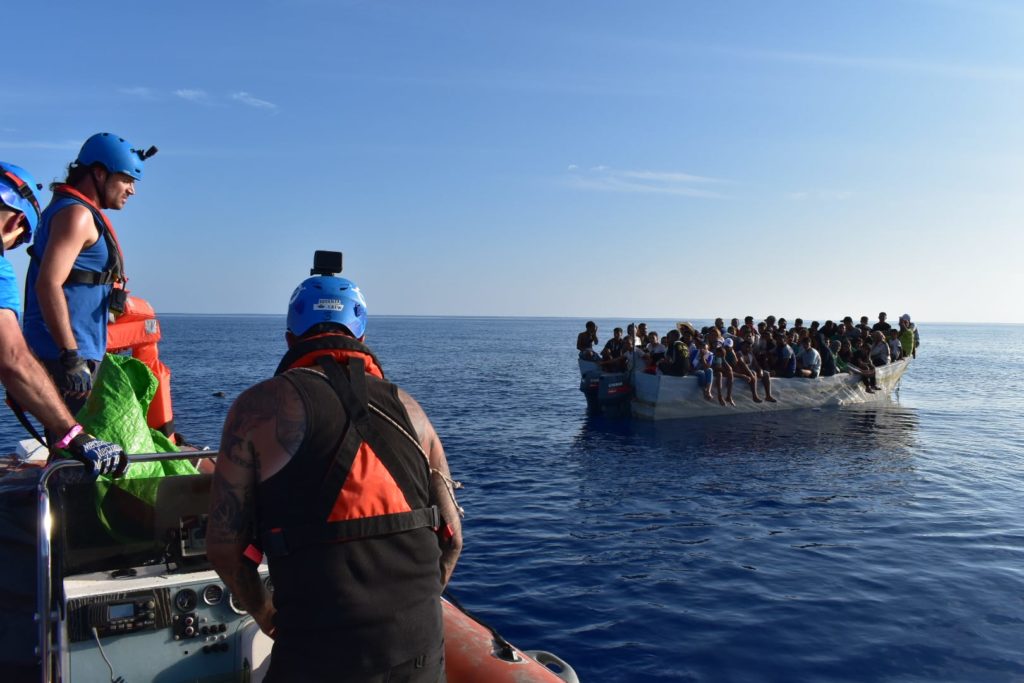
The support boat sponsored by the Migrantes Foundation carried medical personnel, an intercultural mediator, and three journalists, alongside Father Alessandro Messina, Director of Migrantesfor the diocese of Fano, and Ms. Donatella D’Anna, director of Migrantes in the diocese of Caltanissetta in central Sicily.
“It was crucial to include journalists, because the world of communication plays a fundamental role in shaping accurate public opinion on migration”, says H.E. Msgr Perego. “Documenting and communicating the reality of migrants is one of the institutional tasks of the Migrantes Foundation, and research has shown that the majority of newspaper articles combine mentions of migrants with terms such as ‘delinquent’, ‘clandestine’, and ‘criminal’. The journalists and staff members who were onboard will produce articles and a report on what is really happening in the Mediterranean: who makes the journey and sometimes dies, where they come from, and the rescue actions of civil society.”
While the SAR mission marked the first official collaboration between Migrantes Foundation and Mediterranea, the Church has long been supportive of the organization’s mission. Pope Francis has met with members of the platform on several occasions, and in 2019 placed a crucifix adorned with a lifejacket, gifted to him by Mediterranea, in the Vatican’s Apostolic Palace.
Prior to departure, the mission was presented with a handwritten message of support from Pope Francis. “I wish you the best and I send my blessing to the crew of Mediterranea Saving Humans and to Migrantes”, the message read. “I pray for you. Thank you so much for your testimony. May the Lord bless you and Our Lady keep you. Fraternally, Francesco”.
Saving lives at sea: 182 persons in 24 hours
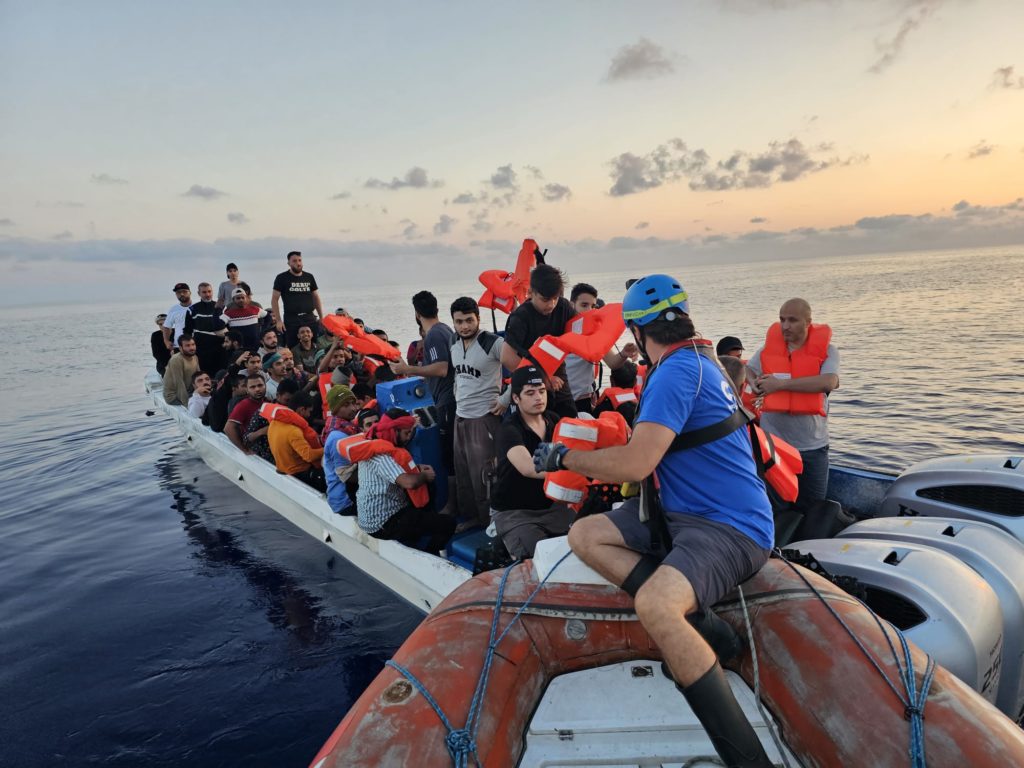
The experiences of the August SAR mission demonstrate the crucial, lifesaving role played by civil society organizations conducting SAR missions in the Mediterranean.
Mediterranea generally learns of migrant vessels in distress via Alarm Phone, a civil society-organized emergency telephone hotline via which migrants can report their position by satellite phone. In other cases, government authorities or civil society-operated aeroplanes report boats in distress, or Mediterranea vessels themselves observe these vessels. Once a vessel in distress is located, the process of transferring its occupants to Mediterannea’s SAR ships begins, after which migrants are provided with food, water, basic healthcare, and a change of clothes.
During the 23-25 August mission of the Mare Jonio, all three of these methods for locating migrant vessels in distress played a part in the rescue of 182 persons in just 24 hours.
On the evening of 24 August, a civilian observation plane operated by the voluntary association Pilotes Volontaires located a ship in distress. The crew of the Mare Jonio stabilized the vessel and distributed lifejackets, and all 67 people onboard, including fifteen children, were transferred to a vessel of the Italian coastguard for disembarkation on Lampedusa.
Later the same night, around 30 miles south of Lampedusa, the Mare Jonio located an overloaded dinghy at imminent risk of sinking. 50 people were taken onboard the Mare Jonio, including 43 unaccompanied minors, many of whom were suffering from severe dehydration after more than four days at sea. All those rescued were transferred to the Italian coastguard for disembarkation on Lampedusa.
The next morning, the Mare Jonio responded to reports of a vessel in distress from Alarm Phone, arriving at the location almost 40 miles south of Lampedusa to find a listing and overloaded fiberglass boat carrying 65 persons, including five unaccompanied minors. The majority of those brought on board the Mare Jonio showed signs of torture and mistreatment suffered prior to their departure from Libya, and were provided with medical attention. Those rescued were transported on the Mare Jonio to the port of Pozzallo in Sicily, assigned as a ‘place of safety’ for the group by the MRCC in Rome.
“Those on our sponsored boat observed the rescues and produced a ‘diary’ of these events, to be used as the basis for newspaper articles and information for our churches and diocesan Migrantes”, explains H.E. Msgr Perego. “Those rescued were men and women, unaccompanied minors, and families, of at least fifteen different nationalities, both Christian and Muslim.”
Looking to the future: cooperation, solidarity, and a role for Europe
In the face of overwhelming loss and suffering in the Mediterranean, the Migrantes Foundation maintains a clear sense of what should change in future in order to save lives.
“The hope is that Europe will once again take the lead in the control and rescue of migrants at sea, with a joint operation of States and a mandatory system for distributing responsibility for asylum seekers across the Union”, states H.E. Msgr Perego. “In the longer term, we need to strengthen the EU Strategy for Africa that was created in 2007, to build cooperation on an equal footing and make good on the promise to involve African civil society in creating solutions. We must also keep alive the presence of civil society in the Mediterranean and, in addition to rescue, denounce unjust rejections of asylum claims and restricted access to international protection.”
In keeping with its institutional mission to raise awareness of migration issues, both within the Church and amongst the general public, the Migrantes Foundation is open to continuing its collaboration with Mediterranea in future.
“It would be important, in my opinion, for other diocesan Migrantes workers, journalists, and pastoral workers to have the same experience, to become sounding boards in our communities for the dramatic situation in the Mediterranean, and to feel, even indirectly, that they are participating in the rescue and protection of migrants who make the crossing”, says H.E. Msgr Perego. “At the same time, the boat we sponsored aimed to be a concrete and visible sign of esteem for and solidarity with those who save migrants in the Mediterranean. As Pope Francis has stated, those doing this work are Samaritans, not criminals, and we will continue to highlight and communicate their work wherever we can.”

Rachel Westerby
Independent writer and researcher on migration, refugees and human rights.
